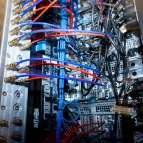Smart Photovoltaic Microgrids for Cooking in Disadvantaged Communities

Every day, billions of households in disadvantaged communities across Africa, India, Asia, and South America burn biomass fuel—that is, firewood or charcoal—to cook meals. This method of cooking leads to more than four million deaths per year attributed to illnesses caused by indoor air pollution from biomass cooking. We are working with Columbia University and the Global Alliance for Clean Cookstoves to develop and pilot smart photovoltaic (PV) microgrid technology that will help communities adopt and accept electric cooking.
The team's smart PV system connects a microgrid, powered by solar panels, to homes. Algorithms distribute power in a prioritized fashion to homes that have signed up to cook at a particular time. If there is excess power at any time, the system alerts other customers immediately if they wish to sign their home up next. Excess power can also be used to activate cell phone-charging stations.
The team is also focusing on delivering safe, simple, and efficient cooking appliances, such as rice cookers, to these communities. Inexpensive rice cookers, which lack controls to cook foods to a specific temperature, constantly draw power even when food is at a boiling temperature. To address this energy waste, the team developed a new controller, connected to a temperature probe or infrared sensor inside the cooker, that turns off power to the appliance once it senses that the food has reached the target temperature. The smart PV power distribution system then redirects energy from that appliance to another household, greatly increasing efficiency.



